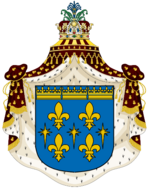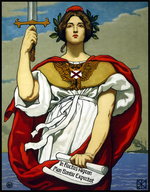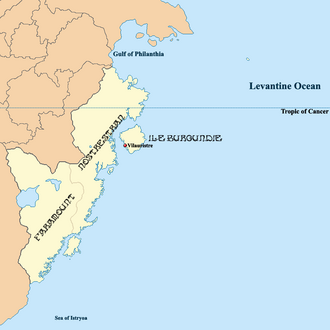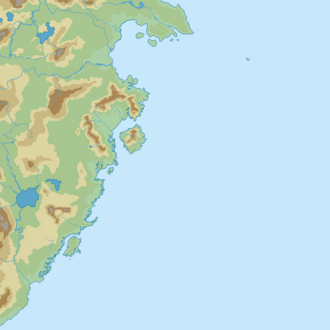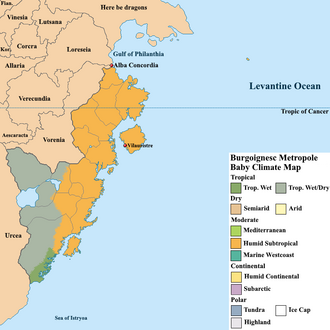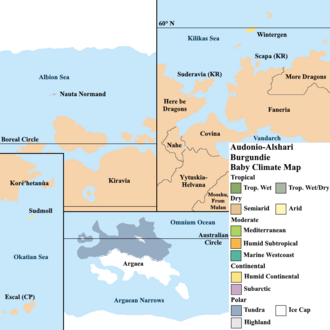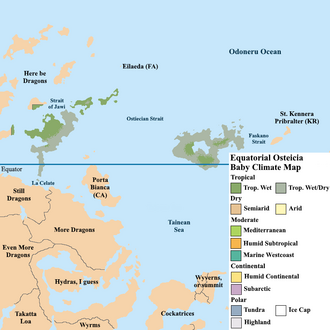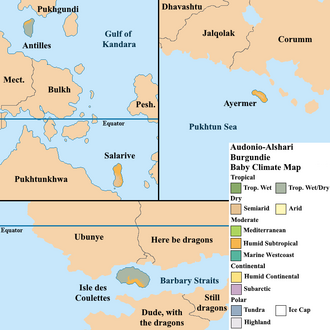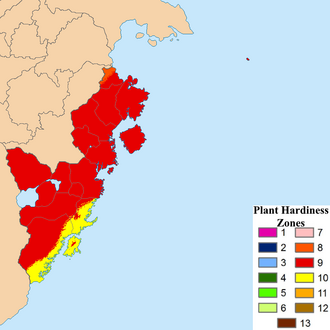Burgundie: Difference between revisions
Tag: 2017 source edit |
Tags: Mobile edit Mobile web edit Advanced mobile edit |
||
| (81 intermediate revisions by 3 users not shown) | |||
| Line 1: | Line 1: | ||
{{Infobox country|native_name = <!--e.g. France--> Burgundie | {{Infobox country|native_name = <!--e.g. France--> Burgundie | ||
|conventional_long_name = | |conventional_long_name = [[Burgoignesc Thalattocracy]] | ||
|common_name = Burgundie | |common_name = Burgundie | ||
|image_flag = BurgFlag.png | |image_flag = BurgFlag.png | ||
|alt_flag = | |alt_flag = | ||
|image_coat = <!--* e.g. Coat of arms of country.svg--> [[File: | |image_coat = <!--* e.g. Coat of arms of country.svg--> [[File:Burg COA.png|150px]] | ||
|alt_coat = <!--alt text for coat of arms--> | |alt_coat = <!--alt text for coat of arms--> | ||
|symbol_type = <!--emblem/seal/... based on image_coat--> Royal mantle and | |symbol_type = <!--emblem/seal/... based on image_coat--> Royal mantle, pavilion, and Coat of Arms | ||
|national_motto = <!--"[[motto]]"--> ''In Fluctus Aigean Mon Bontie Expectat''<br><small>Upon the Ocean Waves My Bounty Awaits</small> | |national_motto = <!--"[[motto]]"--> ''In Fluctus Aigean Mon Bontie Expectat''<br><small>Upon the Ocean Waves My Bounty Awaits</small> | ||
|national_anthem = [[Rule, Bergendia!]] | |national_anthem = [[Rule, Bergendia!]] | ||
| Line 13: | Line 13: | ||
|other_symbol_type = National Symbol: </b>Marin-Estelle<br><small>Personification of Burgundie's destiny at sea</small> | |other_symbol_type = National Symbol: </b>Marin-Estelle<br><small>Personification of Burgundie's destiny at sea</small> | ||
|other_symbol = [[File: Marin Estelle.png|150px]] | |other_symbol = [[File: Marin Estelle.png|150px]] | ||
|image_map = | |image_map = Burg Ortho Map.png | ||
|alt_map = | |alt_map = | ||
|map_caption = | |map_caption = Location of Burgundie (dark green)<br>In the [[Levantine Union]] (light green)<br>And [[Bulkh]] in {{wp|real union}} with Burgundie (light green) | ||
|image_map2 = | <br>The [[Burgoignesc Thalattocracy]] (lime green) | ||
|image_map2 = | |||
|alt_map2 = <!--alt text for second map--> | |alt_map2 = <!--alt text for second map--> | ||
|map_caption2 = <!--Caption to place below second map--> | |map_caption2 = <!--Caption to place below second map--> | ||
| Line 22: | Line 23: | ||
|latd= | latm= | latNS = <!--capital's latitude degree/min/dir--> | |latd= | latm= | latNS = <!--capital's latitude degree/min/dir--> | ||
|longd= |longm= |longEW = <!--capital's longitude deg/min/dir--> | |longd= |longm= |longEW = <!--capital's longitude deg/min/dir--> | ||
|largest_city = [[ | |largest_city = [[Port Diteaux]] | ||
|largest_settlement = <!--(if not a city)--> | |largest_settlement = <!--(if not a city)--> | ||
|largest_settlement_type = <!--Type of settlement if largest settlement not a city--> | |largest_settlement_type = <!--Type of settlement if largest settlement not a city--> | ||
|official_languages = <!--e.g. English, French--> [[ | |official_languages = <!--e.g. English, French--> [[Burgoignesc language|Burgoignesc]], {{wpl|Ecclesiastical Latin|Latin}} | ||
|national_languages = <!--Officially recognized national languages--> [[ | |national_languages = <!--Officially recognized national languages--> [[Burgoignesc language|Burgoignesc]], {{wpl|Ecclesiastical Latin|Latin}} | ||
|regional_languages = <!--Officially recognized regional languages--> [[ | |regional_languages = <!--Officially recognized regional languages--> [[Burgoignesc language|Burgoignesc]], {{wpl|Ecclesiastical Latin|Latin}}, [[Lebhan language|Lebhan]], [[Udunaic]], [[Sinitalian]] | ||
|languages_type = <!--Other type of languages --> | |languages_type = <!--Other type of languages --> | ||
|languages = <!--Other languages list--> | |languages = <!--Other languages list--> | ||
| Line 40: | Line 41: | ||
|sovereignty_type = | |sovereignty_type = | ||
|sovereignty_note = | |sovereignty_note = | ||
|established_event1 = | |established_event1 = | ||
|established_date1 = | |established_date1 = | ||
|established_event2 = | |established_event2 = | ||
|established_date2 = | |established_date2 = | ||
|established_event3 = | |established_event3 = | ||
|established_date3 = | |established_date3 = | ||
|established_event4 = | |established_event4 = | ||
|established_date4 = | |established_date4 = | ||
|established_event5 = | |established_event5 = | ||
|established_date5 = | |established_date5 = | ||
|established_event6 = | |established_event6 = Unification | ||
|established_date6 = [[ | |established_date6 = [[1875]] | ||
|area_rank = | |area_rank = | ||
|area_magnitude = | |area_magnitude = | ||
|area = <!-- major area size (in [[Template:convert]] either km2 or sqmi first) --> () | |area = <!-- major area size (in [[Template:convert]] either km2 or sqmi first) --> () | ||
|area_km2 = | |area_km2 = 2,943,262.505 | ||
|area_sq_mi = | |area_sq_mi = auto | ||
|area_footnote = <!-- optional footnote for area --> | |area_footnote = <!-- optional footnote for area --> | ||
|percent_water = | |percent_water = | ||
| Line 62: | Line 63: | ||
|area_label2 = <!-- label below area_label (optional) --> | |area_label2 = <!-- label below area_label (optional) --> | ||
|area_dabodyalign = <!-- text after area_label2 (optional) --> | |area_dabodyalign = <!-- text after area_label2 (optional) --> | ||
|population_estimate = | |population_estimate = | ||
|population_estimate_rank = | |population_estimate_rank = | ||
|population_estimate_year = | |population_estimate_year = | ||
|population_census = | |population_census = 393,741,767 | ||
|population_census_year = [[ | |population_census_year = [[2035]] | ||
|population_density_km2 = | |population_density_km2 = 133.777 | ||
|population_density_sq_mi = | |population_density_sq_mi = auto | ||
|population_density_rank = | |population_density_rank = | ||
|GDP_nominal = ₮19, | |GDP_nominal = ₮19,754,024,450,390 <br><small>₮19.75 trillion</small> | ||
|GDP_nominal_per_capita = ₮50,170 | |GDP_nominal_per_capita = ₮50,170 | ||
|Gini = 45.8 | |Gini = 45.8 | ||
|Gini_rank = | |Gini_rank = | ||
|Gini_year = [[ | |Gini_year = [[2035]] | ||
|Gini_change = decrease | |Gini_change = decrease | ||
|Gini_category = | |Gini_category = | ||
|HDI = 0.867 | |HDI = 0.867 | ||
|HDI_rank = | |HDI_rank = | ||
|HDI_year = [[ | |HDI_year = [[2035]] | ||
|HDI_change = increase | |HDI_change = increase | ||
|HDI_category = | |HDI_category = | ||
|currency = [[Taler|Levantine Union Taler]] | |currency = [[Taler|Levantine Union Taler]] | ||
|currency_code = ''₮'' | |currency_code = ''₮'' | ||
|time_zone = Urceopolitan Mean Time | |time_zone = Urceopolitan Mean Time +1 | ||
|utc_offset = <!-- +N, where N is number of hours--> | |utc_offset = <!-- +N, where N is number of hours--> | ||
|time_zone_DST = | |time_zone_DST = | ||
| Line 104: | Line 105: | ||
}} | }} | ||
''The Grand | ''The Grand Thalattocratic Republican Principality of Burgundie and her Commonwealth'', commonly known as the ''[[Burgoignesc Thalattocracy]]'', the ''Thalattocracy'', or ''Burgundie'', is a nation composed of 5 constituent countries ([[Ile Burgundie]], [[Notrestran]], [[Faramount]], [[Equatorial Ostiecia]], the constituent country equivalent [[BORA|Burgoignesc Overseas Representative Assembly (BORA)]]), and the uninhabited extra-territorial exclave of [[Port Extranjero]]. At just over 2.9 million square kilometers (1.1 million sqmi), Burgundie is moderately sized country. With a population of around 393.7 million people, Burgundie is a highly-density nation with 133.777 people per square kilometer (346.5 people/sqmi). | ||
east, | The capital of Burgundie is [[Vilauristre]], located on [[Ile Burgundie]], which is also the capital country, located just off the coast of southeastern [[Levantia]] across the [[Geography of Burgundie#Alavarian Strait|L'Estrech Alavarienne]]. The country of [[Nostrestran]] is located along the southeastern coast of [[Levantia]] bound by the [[Sea of Istroya]] in the east, [[Lapody]] in the north and west, and the Burgoignesc country of [[Faramount]] to the south. [[Faramount]] is adjacent to [[Nostrestran]] along the southeastern coast of [[Levantia]]. It is bound by the [[Sea of Istroya]] in the east and south, [[Lapody]] in the north, and [[Urcea]] in the west. [[Equitorial Ostiecia]] is along the confluence of the [[Odoneru Ocean]], the [[Tainean Sea]],and [[St. Brendan's Strait]]. The constituent country equivalent [[BORA]] is made up of 10 islands: [[Alcairet]], [[Antilles]], [[Argaea]], [[Chaukhira]], [[Iles Evangeline]], [[Nauta Normand]], [[Port de Vent]], [[Sudmoll]], [[Torlen]], and [[Wintergen]] which are located across the globe. Burgundie and its territories stretch across all 24 time zones from [[Port Extranjero]] in UTC -12 to [[Iles Evangeline]] in UTC +12. The extremely diverse [[Geography of Burgundie|geography, climate, and wildlife]] of Burgundie and its possessions make it one of the world's megadiverse countries. | ||
''' | Burgundie is a {{wpl|thalassocracy|thalattocracy}} meaning that it considers itself primarily a maritime empire whose land holdings are secondary in importance to its maritime claims. This posture leads Burgundie to take [[Burgoignesc Security Forces|enforcement]] of open and fair trade across the waterways ([[Freedom of the seas]]) very seriously and personally. The nation’s head of state, and its executive branch, the [[Government_of_Burgundie#Executive_Branch|Court of St. Alphador]], is a [[Government_of_Burgundie#Great_Prince_of_Burgundie|Great Prince]], a term that recognizes that the Prince of Burgundie is superior in authority all other provincial leaders, including the princes of [[Equitorial Ostiecia]], [[Faramount]], and the Duke of Marialianus who nominally serves as the prince of [[Nostrestran]], the constituent principalities within the [[Burgoignesc Thalattocracy]]. Because it is a {{wpl|Crowned republic}} its hosts a parliament called the [[Government_of_Burgundie#Legislative_Branch|Citizens Court of the National Assembly]] ([[Burgoignesc language||Burg]]: ''La Assemblee de Ciutadans de l'Assemblee Nacional'', ACAN). The Assembly is the unicameral legislative body of the nation with representatives from the citizenry, the [[Catholic Church|Church]], the nobility, and the Royal Family. Each member of the council is afforded one vote and the great prince is legally bound to represent the decisions of the National Assembly. The country's third branch of government, the judicial branch, is called the [[Government_of_Burgundie#Judicial_Branch|Lazarine Court]], and serves as the nation's supreme court, however, unique to Burgundie is the [[Government_of_Burgundie#Maritime_Prefecture|Maritime Prefecture]] which serves as a co-equal supreme court for maritime matters. | ||
Burgundie is a {{ | Burgundie is a founding member of the [[League of Nations]], {{wp|World Bank}}, {{wp|International Monetary Fund}}, {{wp|World Health Organization}}, {{wp|World Trade Organization}}, {{wp|International Maritime Organization}}, {{wp|World Food Program}}, {{wp|International Red Cross}}, and other international organizations. Burgundie is a highly developed country, with a GDP of $19.75 trillion and a GDPPC of $50,170. It accounts for approximately a 47% of the world’s maritime shipping traffic which has made the country rich. However, since it lacks a diverse native manufacturing base it is susceptible to fluctuations in the global markets. Burgundie is an {{wpl|information economy}}, characterized by the dominance of services and knowledge-based activities, although the nation's shipyards keep the manufacturing sector world class. Burgundie is the world's largest importer operating on a massive trade deficit that it offsets with its taxes on the shipping industry as well an aggressive international loan policy. Burgundie ranks among the highest nations in several measures of socioeconomic performance, including average wage, human development, per capita GDP, and productivity per person. Burgundie is a sizable [[Burgundian Security Forces|military power]] in the world and is a preeminent political, cultural, and scientific force giving it significant power projection both in real and soft terms. | ||
Burgundie is | Being formally recognized in its current form in [[1875]], Burgundie, as a unified nation, is relatively new. The [[Burgoignesc Metropole]] was inhabited by <s>Celtic</s> peoples known as the <s>{{wpl|Picts|Impaxi}}</s> starting around 2800 BC. In the 500s BC the seafaring [[Adonerii civilization]] arrived along the southern coast of [[Levantia]]. In [[158]] AD the [[Latinic]] commander Julian Marcilius Corvus crushed native resistance on the [[Ile Burgundie]], then called <s>Ipar</s>, and established the Bergenddium, a state that lasted until it was broken up in the 1090s. Following the [[Great Confessional War]] the Burgoignesc, Estienne, and Martillian trading companies created massive overseas empires, free from the confines of [[Holy Levantine Empire|Imperial]] rule. The greatest of these empires, the Burgoignesc South Levantive Trading Company started to collapse in on itself from overextension in the 1780s. Around the same time, the enlightenment and scientific revolution and then later the industrial revolution led to a series of anti-monarchist and pro-democratic/social revolts across the southern coast of the [[Kingdom of Dericania]]. The reactionary powers attempted to crush these revolts and led to the [[First Fratricide]], which mediatized much of the [[Kingdom of Dericania]] and formed Burgundie from a number of the southern coastal principalities. The new nation set about a course of standardization, driven by scientists, industrialists, and new governments wanted to be considered a modern nation. By the early 20th century Burgundie was becoming as powerful in continental politics as the whole of the [[Kingdom of Dericania]], in its own right. During the [[Second Great War]] [[Burgundie]] fought on the side of the Western Coalition, bringing it into the global spotlight. It was one of the powers, along with its ally [[Urcea]] that fought on all fronts of the [[Second Great War]]. After the end of the [[Second Great War]] Burgundie helped to establish many of the new globalist institutions that cropped up in that era. Burgundie did this as part of its self determined new mission and duty, as it sought ot find a place for itself in the post-Great War world. Burgundie set out to protect the liberties and freedoms it held dear, for all peoples around the world. This Occidental view of what the basic human rights were and its role in upholding them led to a series of [[Operation Kipling|anti-communist wars]] in [[Audonia]] and [[Alshar]]. This cotributed to and coincided with an urban and cultural revolution across the Thalattocracy that changed the country from a moderately authoritarian and reactionary holdover from the [[Holy Levantine Empire]] to a modern liberal {{wpl|Crowned republic}} and the advent of {{wpl|Containerization}} both of which brought Burgundie into the 21st century at full tilt. | ||
==Traditions and national ethos== | |||
Burgundie is a {{wpl|thalassocracy}}, a tradition it attributes and claims continuity with the ancient [[Adonerum]]. It is also a [[Latinic|Latino]]-[[Istroyan]] cultural hybrid and as such claims foundational continuity with the origins of [[Occidental]] culture. It furthermore played a key role in the rule and maintenance of the middle and late [[Holy Levantine Empire]] which Burgoigniacs believe give their nation cache earned in the political affairs of [[Levantia]]. Lastly, Burgundie spent much of the Age of Navigation in search of the Three Magi and their cultural analogues. As such, it sought and became enmeshed with the affairs of [[Audonia]] and [[Alshar]] via the [[Burgoignesc colonial empire]]. | |||
It is only recently that Burgundie has taken a softer, more diplomatic and aide-focused approach to global politics. It has often resorted to {{wpl|interventionism}}, {{wpl|paternalism}}, and [[Burgoignesc colonial empire|colonialism]] to maintain its standing and achieve its national objectives. As such its: military is enormous, has more political cache, and maintains more direct agreements (treaties, pacts, trade agreements) than is necessary for its size and position in the world. Additionally, its culture and language is endemic in many parts of the world as a vestige of its colonial past. | |||
==Etymology== | ==Etymology== | ||
Burgundie derives its name from the ''brugan'' (Eng. {{wpl|Erica|spring heather}}), a {{wpl|calcifuge}} that thrives in the {{wpl|andisol}} of the [[Belrac caldera]]'s higher elevations on the [[Ile Burgundie]]. In the classical era the heather was considered the "lighthouse at the end of Istroyan civilization" while there were additional settlements by the [[Ancient Istroyan civilization]] further north in eastern [[Levantia]] they never achieved the status of the principal core city-states that dotted northeastern [[Sarpedon]] and southern [[Levantia]]. | |||
The spelling has been corrupted over three major linguistic shifts, suffering degradation in each of these transliterative {{Wpl|phono-semantic matching}} occurrences. While the heather itself is still spelled and pronounced brug- (Burg: le brugose), the nation itself lost its direct connection to the heather and was no longer linguistically tied to it when Latin became the lingua franca of the area around 100 BC. | |||
==Economy== | |||
{{Further|Economy of Burgundie}} | |||
Burgundie is a founding member of a number of global the League of Nations, World Bank, International Monetary Fund, World Health Organization, World Trade Organization, International Maritime Organization, World Food Program, International Red Cross, and other international organizations. Burgundie is a highly developed country, with a GDP of $19.1 trillion and a GDPPC of $50,170. It accounts for approximately a 47% of the world’s maritime shipping traffic which has made the country rich. However, since it lacks a diverse native manufacturing base it is susceptible to fluctuations in the global markets. | |||
Burgundie is the world's largest importer operating on a massive trade deficit that it offsets with its taxes on the shipping industry as well an aggressive international loan policy. Burgundie ranks among the highest nations in several measures of socioeconomic performance, including average wage, human development, per capita GDP, and productivity per person. | |||
Burgundie is a highly developed, {{wpl|post-industrial}}, {{wpl|Tertiary sector of the economy|agro}}-{{wpl|Tertiary sector of the economy|services}} economy. Services, particularly maritime logistics, medical, and education make us the largest sector of financial activity. However, {{wpl|Agribusiness}} constitute the largest sector by number of employee. Based in the [[Latinic]] concept of {{wpl|latifundium}}, and later colonial {{wpl|patroon}}ships, large-scale, commercial agriculture is cornerstone of the Burgoignesc economic engine both in the [[Burgoignesc Metropole]] and its overseas territories. | |||
== | ===Agriculture=== | ||
Burgundie has two major agricultural zones. I. The northeastern provinces of [[Marialianus]] and X, the humid subtropical climate allows for a broad range of agricultural products. These include: | |||
*{{wp|Capers}} | |||
*{{wp|Olives}} | |||
*{{wp|Cork}} | |||
*{{wp|Sorghum virgatum}} | |||
The majority of the country has a tropical wet climate with strong monsoons and hurricanes that greatly limit the amount of viable species that can survive there. {{wp|Sorghum virgatum}} is the historical staple crop. | |||
=== | ====Haloculture==== | ||
{{Further|Flower of salt, Poro ruru}} | |||
====Viticulture==== | |||
{{Further|Burgoignesc wine regions}} | |||
== | ===Tourism=== | ||
<gallery mode="packed"> | |||
File:Bains romains d'Essalhine Khenchela, Algerie.jpg | |||
</gallery> | |||
===Trade=== | |||
====Maritime shipping==== | |||
{{Further|Merchant Marine of Burgundie}} | |||
=====Key maritime shipping companies===== | |||
*[[O'Shea Container Shipping]] | |||
*[[Burgoignesc North Levantine Trading Company]] | |||
*[[Burgoignesc South Levantine Trading Company]] | |||
*[[Port Extranjero]] | |||
===Finance sector=== | |||
=== | ===Manufacturing=== | ||
[[ | ====Shipwrights==== | ||
=====Key shipwrights===== | |||
*[[Doppel Gangway]] | |||
*[[Lansing Lines]] | |||
*[[O'Shea Container Shipping]] | |||
=== | ====Defense industry==== | ||
=====Key defense companies===== | |||
==== | *[[Gerin-Lajoie Weaponeering]] | ||
[[ | *[[Lansing Lines]] | ||
*[[Lansing-Mitchell Weaponeering]] | |||
*[[Cross Trucking Company]] | |||
=== | ===Mining and mineral extraction=== | ||
{{ | *{{wp|Lignite coal}} | ||
*Subbitumimous coal | |||
*Amber | |||
==== | ====Key Mineral extraction companies==== | ||
*[[List_of_companies_by_industry_in_Burgundie#Mineral_Extraction|Baiereal Petrochemical]] | |||
*[[List_of_companies_by_industry_in_Burgundie#Mineral_Extraction|Shalerod Mining]] | |||
==== | ===Industrial recycling=== | ||
{{ | E-recycling, Rare earth metals recovery | ||
[[ | ===Infrastructure=== | ||
====Rail==== | |||
{{Further|Rail transportation in Burgundie}} | |||
Burgundie uses [[Track gauges around the world|Standard gauge]], 1,435 mm (4 ft 8+1⁄2 in) as most of its rail infrastructure has been under the auspices of the [[Holy Levantine Empire]] and the [[Levantine Union]], who all use that rail gauge. It has propagated this into a global standard across the [[Burgoignesc thalattocracy]]. | |||
==== | ====Roads==== | ||
=== | ===Econonmic history=== | ||
{{ | During the 17th and 18th century, due to the technological explosion of the {{wpl|Renaissance|Late Renaissance}}, later {{wpl|Enlightenment}}, and its resulting [[Burgoignesc Colonial Empire|colonial empire]], Burgundie had a preeminent role in the global economy, accounting for 5.1% of the world's GDP in [[1770]]. The loss of much of its [[Burgoignesc Colonial Empire|colonial empire]], lagging behind in the adoption of industrialization in the 19th century, and the cost of fighting both the [[First Great War|First]] and [[Second Great War]]s as well as [[Operation Kipling]] further weakened Burgundie's relative position in the 20th century. Despite a relative decline in its global dominance, in the 21st century Burgundie retains the ability to project significant power and influence around the world. | ||
In the 18th century, Burgundie was among the first nations to industrialise. | |||
==History== | |||
Main article: [[History of Burgundie]] | |||
[[File:DevofBurgCulture.png|800px|center]] | |||
==== | ===Classical History in Burgundie=== | ||
Main article: [[Great_Levantia#Impaxi_Wars_and_Brugandia|Great Levantine Province of Brugandia]] | |||
In the classical period the lands that make up the [[Burgoignesc Metropole]] were predominantly controlled by city-states of the [[Ancient Istroyan civilization]] or as a province of [[Great Levantia]]. | |||
===Medieval History in Burgundie=== | |||
Main article: [[History of Dericania]] | |||
During the medieval period the lands that make up the [[Burgoignesc Metropole]] were controlled by princelings of the [[Kingdom of Dericania]]. They has very little in common and each perused their own destiny. | |||
===Early Modern History in Burgundie=== | |||
Main article: [[History of Dericania]] | |||
During the early modern period the lands that make up the [[Burgoignesc Metropole]] were still controlled by princelings of the [[Kingdom of Dericania]]. They has very little in common but they began to express common themes that began to differentiate them from the remainder of [[Dericania]]. This is especially true of the [[Burgoignesc colonial empire]], a neolog applied to the colonial enterprises of the Duchies of Martilles, Marialianus, and Burgundie. | |||
===Late Modern History in Burgundie=== | |||
Main article: [[History of Burgundie]] | |||
Burgundie emerged from the [[First Fratricide]] unifying many of the coastal states of the [[Kingdom of Dericania]] and sought its own future, leaving the kingdom all together. It became a moderate player in global politics but continued the trend of its predecessor states of being a major global shipping and trade partner. It was a primary belligerent in the [[First Great War|First]] and [[Second Great War]]s as well as a co-founding member of many of the global aid organizations that were convened as a result. | |||
==== | ==Government== | ||
{{ | Main article: [[Government of Burgundie]] | ||
[[ | {{Government of Burgundie}} | ||
[[Burgundie]] is a {{wpl|Federalism|federal}} {{wp|crowned republic}} under the sovereignty of a Great Prince, who in turn, serves the {{wpl|Pacta conventa}} of [[The Burgundies]]. The [[Government of Burgundie]] is a {{wpl|Representative democracy}}, served by {{wpl|congress}}es at local, provincial, and constituent country level. At the national level the [[Government_of_Burgundie#Legislative_Branch|Citizens Court of the National Assembly (Burg. La Assemblee de Ciutadans de l'Assemblee Nacional, ACAN)]] serves as the highest congress of the land. | |||
All political entities in [[Burgundie]] are governed through the concept that all government is local. The layered approach is an important part of Burgoignesc political culture. The sense of civic engagement in government is high. | |||
==== | ===Administrative Divisions=== | ||
===Military=== | |||
Main article: [[Burgoignesc Security Forces]] | |||
== | ===Foreign Relations=== | ||
Main article: [[Foreign Relations of Burgundie]] | |||
Burgundie has been seen as a historical aggressor with a long history of [[Burgoignesc colonial empire|colonialism]], [[Culture_in_Burgundie#Slavery|purveyor of chattel slavery]], [[Culture_in_Burgundie#Cultural_hegemony|military and economic interventionist paternalism]], and Christian proselytization. This has led to a number of global conspiracies regarding Burgundie from [[Global Burgieman]] to [[Levantine Creep]], and unflattering characterizations like [[Brother Auggie]]. This attitude colors both Burgundie's relations with the world and the world's perception of Burgoignesc intent. In this post-[[Operation Kipling]] era, specifically under the [[List_of_Rulers_of_Burgundie#Palacin_Dynasty|Palacin Dynasty]] ([[Pasqual I]] and his heir apparent [[Crown Princess Amelia]]) the country has taken a much softer tone with recognition of its role in the aforementioned grievances. Since the 1990s the country, spearheaded by the Palacin family has sought to focus on the role Burgundie has played in the modernization of the world since the end of the [[Second Great War]] ([[containerization]]), the minimalization of death and suffering across the globe, the multi-lateral approach the country now takes with its participation in transnational organizations like the [[League of Nations]] and the [[Levantine Union]], the efforts to not suppress economic growth in its post-colonial countries, but to develop healthy, wealthy, global markets. These efforts are recognized as just the beginning of a long period of global healing that Burgundie needs to lead. They have proven to be fruitful in the short term as the opening and expanding of markets, both economic and of academic, have given Burgundie access to incredible human and financial capital the world over. | |||
Burgundie has historically sided with the southern [[Levantia|Levantine]] powerhouse [[Urcea]] in global politics. However, Burgundie is the first to extend the olive branch in the name of open commerce and global stabilization which it has done with both [[Caphiria]] and [[Kiravia]]. Burgundie currently maintains good relations with all three countries nations and is sometimes used as an intermediary between the three superpowers when tension is on the verge of breaking out into violence, or when tensions are coming down and a de-escalation is sought. However, Burgundie is attached at the hip to [[Urcea]] through history, culture, and institutions like the [[Levantine Union]] and [[Caphiria]] and [[Kiravia]] see Burgundie through that lens. | |||
With the remainder of the [[Occidental world]] and the regional powers of [[Daxia]] and [[Stenza]], Burgundie maintains good and open relationships. Burgundie serves with many of these nations on global institutions like the [[League of Nations]] but not in permanent seat status, as well as organizations like the Red Cross, the World Bank, etc. Burgundie is particularly close/allied to the nations of [[Arcerion]], [[Cartadania]], [[Pelaxia]], [[Paulastra]], and [[Yonderre]]. | |||
====Territory disputes==== | |||
Burgundie has two low-intensity but open territory disputes. They are over ownership of [[Sudmoll Island Conflicts|Sudmoll]] and [[Stewardship of Wintergen (government-in-exile)|Wintergen]]. | |||
=====Sudmoll controversy===== | |||
Main article: [[Sudmoll Island Conflicts]] | |||
Following its independence in [[1921]], [[Stenza]] laid claim to the Burgoignesc island of [[Sudmoll]]. On a number of politically advantageous occasions, the [[Stenzan Armed Forces]] have been dispatched to occupy the island often leading to an escalation of tension between [[Stenza]] and Burgundie. There have also been a number of flashpoints between [[Stenza]]n and [[Sudmoll]]ese fishing and merchant fleets that have had to be broken up by the coast guards of both countries. To this day the matter remains unsettled with both nations claiming the island, but [[Stenza]]'s last concerted effort to exert control over the island was in [[1984]]. | |||
=====Wintergen controversy===== | |||
Main article: [[Stewardship of Wintergen (government-in-exile)]] | |||
== | ==Geography== | ||
Main article: [[Geography of Burgundie]] | |||
==Culture== | |||
Main article: [[Culture in Burgundie]] | |||
{{Template:Culture_in_Burgundie}} | |||
Culturally, Burgundie is one of the least vernacular and most mechanical nations in the world. This means that there is a level of homongony across the diverse and vast [[Burgoignesc Thalattocracy|thalattocracy]]. This is an accidental side effect of the centralized, planned mechanization put forward by the various royal institutions since the [[First Fratricide]], but especially since the [[Second Great War]]. These mechanization efforts, namely in the wide spread use of air conditioning, mass transit, and subsidized domestic migration have allowed the Burgoigniacs to live anywhere in the world under the same conditions as they would on the [[Ile Burgundie]]. | |||
Many international sociologists term this ''Laissez-faire Vilauristrification'' in reference to the fact that the phenomenon was accidental and that the Burgoignesc cultural experience is becoming more like that of the capital in [[Vilauristre]]. This has been more noticeable in the Burgoignesc territories outside of the [[Burgoignesc Metropole]], as [[Levantia|Levantine]] Burgoignesc culture is the core that many other vernacular cultures within the [[Burgoignesc Thalattocracy|thalattocracy]] are being pulled towards. Outside of Burgundie, this has been observed across southern [[Audonia]] and western [[Alshar]]. Many in these areas see Burgundie as the paragon of modernization and progress and thus have adopted many of the mechanizations that have led to this shift in Burgundie. | |||
[[ | |||
However, over the last 50 years [[Equatorial Ostiecia]] has come be the [[Culture in Burgundie|cultural]] and [[Economy of Burgundie|economic]] center of Burgundie, in essence, creating a foil to the [[Burgoignesc Metropole]]. | |||
| | |||
== | ==Map Gallery== | ||
===Administrative Divisions=== | |||
====Burgoignesc Metropole==== | |||
Main Article: [[Burgoignesc Metropole]] | |||
<gallery mode="packed" heights="220"> | |||
File:Burg_Metropole_Country_Map.png|Countries in the Burgoignesc Metropole: Ile Burgundie, Nostrestran, Faramount | |||
</gallery> | |||
=====Ile Burgundie===== | |||
Main Article: [[Ile Burgundie]] | |||
[[File:IleBurgundieFlag.png|200px|right]] | |||
=====Nostrestran===== | |||
Main Article: [[Nostrestran]] | |||
[[File:NostrestranFlag.png|200px|right]] | |||
=====Faramount===== | |||
Main Article: [[Faramount]] | |||
[[File:Faramount.png|200px|right]] | |||
=====Equitorial Ostiecia===== | |||
Main Article: [[Equitorial Ostiecia]] | |||
[[File:BourgondiFlag.png|200px|right]] | |||
=====BORA===== | |||
Main Article: [[Government_of_Burgundie#Constituent_Countries|BORA]] | |||
[[File:BORAFlag.png|200px|right]] | |||
== | ===Topographic Maps=== | ||
<gallery mode="packed" heights="220"> | |||
File:Burg_Metropole_Topo_Map.png|Burgoignesc Metropole | |||
</gallery> | |||
===Climate Maps=== | |||
<gallery mode="packed" heights="220"> | |||
File:Burg Metropole Baby Climate Map.png|Burgoignesc Metropole | |||
File:2021 Polar Burg Climate.png|Burgoignesc Polar territories | |||
File:2021 Equatorial Osteicia Climate.png|Equatorial Osteicia | |||
File:Audonio-Alshari Burg Baby Climate.png|Burgoignesc Audonio-Alshari territories | |||
</gallery> | |||
===Plant Hardiness Maps=== | |||
Do you even lore if you don't have a {{wpl|plant hardiness}} map? | |||
<gallery mode="packed" heights="220"> | |||
File:Burg_Metropole_Plant_Hardiness_Map.png|Burgoignesc Metropole | |||
</gallery> | |||
== | ==See also== | ||
{{Burgundie NavBox}} | |||
Burgundie | |||
[[Category:Countries]] | |||
[[Category:Burgundie]] | [[Category:Burgundie]] | ||
[[Category:IXWB]] | [[Category:IXWB]] | ||
Latest revision as of 18:56, 17 November 2024
Burgundie | |
|---|---|
Motto: In Fluctus Aigean Mon Bontie Expectat Upon the Ocean Waves My Bounty Awaits | |
Anthem: Rule, Bergendia! | |
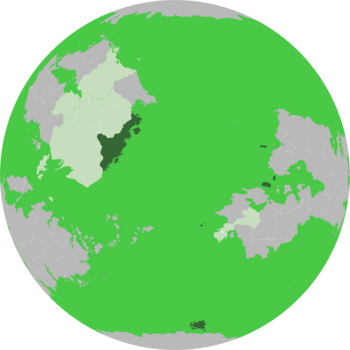 Location of Burgundie (dark green) In the Levantine Union (light green) And Bulkh in real union with Burgundie (light green) The Burgoignesc Thalattocracy (lime green) | |
| Capital | Vilauristre |
| Largest | Port Diteaux |
| Official languages | Burgoignesc, Latin |
| Recognised national languages | Burgoignesc, Latin |
| Recognised regional languages | Burgoignesc, Latin, Lebhan, Udunaic, Sinitalian |
| Demonym(s) | Burgoignac (m) Burgoignix (f) |
| Government | Great Republican Principality |
• Chief Minister | Ermengarde-Cecil Draiselle de Pristoria |
• Great Prince of Burgundie | Pasqual I |
| Area | |
• | 2,943,262.505 km2 (1,136,400.006 sq mi) |
| Population | |
• 2035 census | 393,741,767 |
• Density | 133.777/km2 (346.5/sq mi) |
| GDP (nominal) | estimate |
• Total | ₮19,754,024,450,390 ₮19.75 trillion |
• Per capita | ₮50,170 |
| Gini (2035) | medium |
| HDI (2035) | very high |
| Currency | Levantine Union Taler (₮) |
| Time zone | Urceopolitan Mean Time +1 |
• Summer (DST) | UTC+0 |
| Date format | dd-mm-yy |
| Driving side | right side |
| Calling code | +917 |
| ISO 3166 code' | BG |
The Grand Thalattocratic Republican Principality of Burgundie and her Commonwealth, commonly known as the Burgoignesc Thalattocracy, the Thalattocracy, or Burgundie, is a nation composed of 5 constituent countries (Ile Burgundie, Notrestran, Faramount, Equatorial Ostiecia, the constituent country equivalent Burgoignesc Overseas Representative Assembly (BORA)), and the uninhabited extra-territorial exclave of Port Extranjero. At just over 2.9 million square kilometers (1.1 million sqmi), Burgundie is moderately sized country. With a population of around 393.7 million people, Burgundie is a highly-density nation with 133.777 people per square kilometer (346.5 people/sqmi). The capital of Burgundie is Vilauristre, located on Ile Burgundie, which is also the capital country, located just off the coast of southeastern Levantia across the L'Estrech Alavarienne. The country of Nostrestran is located along the southeastern coast of Levantia bound by the Sea of Istroya in the east, Lapody in the north and west, and the Burgoignesc country of Faramount to the south. Faramount is adjacent to Nostrestran along the southeastern coast of Levantia. It is bound by the Sea of Istroya in the east and south, Lapody in the north, and Urcea in the west. Equitorial Ostiecia is along the confluence of the Odoneru Ocean, the Tainean Sea,and St. Brendan's Strait. The constituent country equivalent BORA is made up of 10 islands: Alcairet, Antilles, Argaea, Chaukhira, Iles Evangeline, Nauta Normand, Port de Vent, Sudmoll, Torlen, and Wintergen which are located across the globe. Burgundie and its territories stretch across all 24 time zones from Port Extranjero in UTC -12 to Iles Evangeline in UTC +12. The extremely diverse geography, climate, and wildlife of Burgundie and its possessions make it one of the world's megadiverse countries.
Burgundie is a thalattocracy meaning that it considers itself primarily a maritime empire whose land holdings are secondary in importance to its maritime claims. This posture leads Burgundie to take enforcement of open and fair trade across the waterways (Freedom of the seas) very seriously and personally. The nation’s head of state, and its executive branch, the Court of St. Alphador, is a Great Prince, a term that recognizes that the Prince of Burgundie is superior in authority all other provincial leaders, including the princes of Equitorial Ostiecia, Faramount, and the Duke of Marialianus who nominally serves as the prince of Nostrestran, the constituent principalities within the Burgoignesc Thalattocracy. Because it is a Crowned republic its hosts a parliament called the Citizens Court of the National Assembly (|Burg: La Assemblee de Ciutadans de l'Assemblee Nacional, ACAN). The Assembly is the unicameral legislative body of the nation with representatives from the citizenry, the Church, the nobility, and the Royal Family. Each member of the council is afforded one vote and the great prince is legally bound to represent the decisions of the National Assembly. The country's third branch of government, the judicial branch, is called the Lazarine Court, and serves as the nation's supreme court, however, unique to Burgundie is the Maritime Prefecture which serves as a co-equal supreme court for maritime matters.
Burgundie is a founding member of the League of Nations, World Bank, International Monetary Fund, World Health Organization, World Trade Organization, International Maritime Organization, World Food Program, International Red Cross, and other international organizations. Burgundie is a highly developed country, with a GDP of $19.75 trillion and a GDPPC of $50,170. It accounts for approximately a 47% of the world’s maritime shipping traffic which has made the country rich. However, since it lacks a diverse native manufacturing base it is susceptible to fluctuations in the global markets. Burgundie is an information economy, characterized by the dominance of services and knowledge-based activities, although the nation's shipyards keep the manufacturing sector world class. Burgundie is the world's largest importer operating on a massive trade deficit that it offsets with its taxes on the shipping industry as well an aggressive international loan policy. Burgundie ranks among the highest nations in several measures of socioeconomic performance, including average wage, human development, per capita GDP, and productivity per person. Burgundie is a sizable military power in the world and is a preeminent political, cultural, and scientific force giving it significant power projection both in real and soft terms.
Being formally recognized in its current form in 1875, Burgundie, as a unified nation, is relatively new. The Burgoignesc Metropole was inhabited by Celtic peoples known as the Impaxi starting around 2800 BC. In the 500s BC the seafaring Adonerii civilization arrived along the southern coast of Levantia. In 158 AD the Latinic commander Julian Marcilius Corvus crushed native resistance on the Ile Burgundie, then called Ipar, and established the Bergenddium, a state that lasted until it was broken up in the 1090s. Following the Great Confessional War the Burgoignesc, Estienne, and Martillian trading companies created massive overseas empires, free from the confines of Imperial rule. The greatest of these empires, the Burgoignesc South Levantive Trading Company started to collapse in on itself from overextension in the 1780s. Around the same time, the enlightenment and scientific revolution and then later the industrial revolution led to a series of anti-monarchist and pro-democratic/social revolts across the southern coast of the Kingdom of Dericania. The reactionary powers attempted to crush these revolts and led to the First Fratricide, which mediatized much of the Kingdom of Dericania and formed Burgundie from a number of the southern coastal principalities. The new nation set about a course of standardization, driven by scientists, industrialists, and new governments wanted to be considered a modern nation. By the early 20th century Burgundie was becoming as powerful in continental politics as the whole of the Kingdom of Dericania, in its own right. During the Second Great War Burgundie fought on the side of the Western Coalition, bringing it into the global spotlight. It was one of the powers, along with its ally Urcea that fought on all fronts of the Second Great War. After the end of the Second Great War Burgundie helped to establish many of the new globalist institutions that cropped up in that era. Burgundie did this as part of its self determined new mission and duty, as it sought ot find a place for itself in the post-Great War world. Burgundie set out to protect the liberties and freedoms it held dear, for all peoples around the world. This Occidental view of what the basic human rights were and its role in upholding them led to a series of anti-communist wars in Audonia and Alshar. This cotributed to and coincided with an urban and cultural revolution across the Thalattocracy that changed the country from a moderately authoritarian and reactionary holdover from the Holy Levantine Empire to a modern liberal Crowned republic and the advent of Containerization both of which brought Burgundie into the 21st century at full tilt.
Traditions and national ethos
Burgundie is a thalassocracy, a tradition it attributes and claims continuity with the ancient Adonerum. It is also a Latino-Istroyan cultural hybrid and as such claims foundational continuity with the origins of Occidental culture. It furthermore played a key role in the rule and maintenance of the middle and late Holy Levantine Empire which Burgoigniacs believe give their nation cache earned in the political affairs of Levantia. Lastly, Burgundie spent much of the Age of Navigation in search of the Three Magi and their cultural analogues. As such, it sought and became enmeshed with the affairs of Audonia and Alshar via the Burgoignesc colonial empire.
It is only recently that Burgundie has taken a softer, more diplomatic and aide-focused approach to global politics. It has often resorted to interventionism, paternalism, and colonialism to maintain its standing and achieve its national objectives. As such its: military is enormous, has more political cache, and maintains more direct agreements (treaties, pacts, trade agreements) than is necessary for its size and position in the world. Additionally, its culture and language is endemic in many parts of the world as a vestige of its colonial past.
Etymology
Burgundie derives its name from the brugan (Eng. spring heather), a calcifuge that thrives in the andisol of the Belrac caldera's higher elevations on the Ile Burgundie. In the classical era the heather was considered the "lighthouse at the end of Istroyan civilization" while there were additional settlements by the Ancient Istroyan civilization further north in eastern Levantia they never achieved the status of the principal core city-states that dotted northeastern Sarpedon and southern Levantia.
The spelling has been corrupted over three major linguistic shifts, suffering degradation in each of these transliterative phono-semantic matching occurrences. While the heather itself is still spelled and pronounced brug- (Burg: le brugose), the nation itself lost its direct connection to the heather and was no longer linguistically tied to it when Latin became the lingua franca of the area around 100 BC.
Economy
Burgundie is a founding member of a number of global the League of Nations, World Bank, International Monetary Fund, World Health Organization, World Trade Organization, International Maritime Organization, World Food Program, International Red Cross, and other international organizations. Burgundie is a highly developed country, with a GDP of $19.1 trillion and a GDPPC of $50,170. It accounts for approximately a 47% of the world’s maritime shipping traffic which has made the country rich. However, since it lacks a diverse native manufacturing base it is susceptible to fluctuations in the global markets.
Burgundie is the world's largest importer operating on a massive trade deficit that it offsets with its taxes on the shipping industry as well an aggressive international loan policy. Burgundie ranks among the highest nations in several measures of socioeconomic performance, including average wage, human development, per capita GDP, and productivity per person.
Burgundie is a highly developed, post-industrial, agro-services economy. Services, particularly maritime logistics, medical, and education make us the largest sector of financial activity. However, Agribusiness constitute the largest sector by number of employee. Based in the Latinic concept of latifundium, and later colonial patroonships, large-scale, commercial agriculture is cornerstone of the Burgoignesc economic engine both in the Burgoignesc Metropole and its overseas territories.
Agriculture
Burgundie has two major agricultural zones. I. The northeastern provinces of Marialianus and X, the humid subtropical climate allows for a broad range of agricultural products. These include:
The majority of the country has a tropical wet climate with strong monsoons and hurricanes that greatly limit the amount of viable species that can survive there. Sorghum virgatum is the historical staple crop.
Haloculture
Viticulture
Tourism
Trade
Maritime shipping
Key maritime shipping companies
- O'Shea Container Shipping
- Burgoignesc North Levantine Trading Company
- Burgoignesc South Levantine Trading Company
- Port Extranjero
Finance sector
Manufacturing
Shipwrights
Key shipwrights
Defense industry
Key defense companies
Mining and mineral extraction
- Lignite coal
- Subbitumimous coal
- Amber
Key Mineral extraction companies
Industrial recycling
E-recycling, Rare earth metals recovery
Infrastructure
Rail
Burgundie uses Standard gauge, 1,435 mm (4 ft 8+1⁄2 in) as most of its rail infrastructure has been under the auspices of the Holy Levantine Empire and the Levantine Union, who all use that rail gauge. It has propagated this into a global standard across the Burgoignesc thalattocracy.
Roads
Econonmic history
During the 17th and 18th century, due to the technological explosion of the Late Renaissance, later Enlightenment, and its resulting colonial empire, Burgundie had a preeminent role in the global economy, accounting for 5.1% of the world's GDP in 1770. The loss of much of its colonial empire, lagging behind in the adoption of industrialization in the 19th century, and the cost of fighting both the First and Second Great Wars as well as Operation Kipling further weakened Burgundie's relative position in the 20th century. Despite a relative decline in its global dominance, in the 21st century Burgundie retains the ability to project significant power and influence around the world.
In the 18th century, Burgundie was among the first nations to industrialise.
History
Main article: History of Burgundie
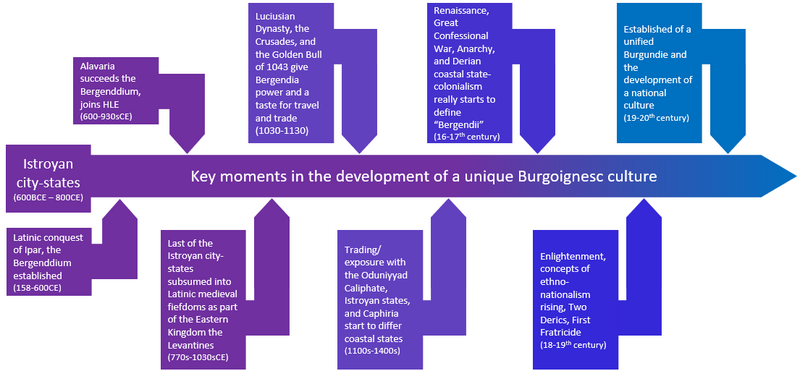
Classical History in Burgundie
Main article: Great Levantine Province of Brugandia In the classical period the lands that make up the Burgoignesc Metropole were predominantly controlled by city-states of the Ancient Istroyan civilization or as a province of Great Levantia.
Medieval History in Burgundie
Main article: History of Dericania During the medieval period the lands that make up the Burgoignesc Metropole were controlled by princelings of the Kingdom of Dericania. They has very little in common and each perused their own destiny.
Early Modern History in Burgundie
Main article: History of Dericania During the early modern period the lands that make up the Burgoignesc Metropole were still controlled by princelings of the Kingdom of Dericania. They has very little in common but they began to express common themes that began to differentiate them from the remainder of Dericania. This is especially true of the Burgoignesc colonial empire, a neolog applied to the colonial enterprises of the Duchies of Martilles, Marialianus, and Burgundie.
Late Modern History in Burgundie
Main article: History of Burgundie Burgundie emerged from the First Fratricide unifying many of the coastal states of the Kingdom of Dericania and sought its own future, leaving the kingdom all together. It became a moderate player in global politics but continued the trend of its predecessor states of being a major global shipping and trade partner. It was a primary belligerent in the First and Second Great Wars as well as a co-founding member of many of the global aid organizations that were convened as a result.
Government
Main article: Government of Burgundie
| This article is part of a series on the |
| Government of Burgundie |
|---|
| Executive Branch |
| Legislative Branch |
| Judicial Branch |
| Administrative divisions |
| Agencies |
|
Burgundie portal |
Burgundie is a federal crowned republic under the sovereignty of a Great Prince, who in turn, serves the Pacta conventa of The Burgundies. The Government of Burgundie is a Representative democracy, served by congresses at local, provincial, and constituent country level. At the national level the Citizens Court of the National Assembly (Burg. La Assemblee de Ciutadans de l'Assemblee Nacional, ACAN) serves as the highest congress of the land.
All political entities in Burgundie are governed through the concept that all government is local. The layered approach is an important part of Burgoignesc political culture. The sense of civic engagement in government is high.
Administrative Divisions
Military
Main article: Burgoignesc Security Forces
Foreign Relations
Main article: Foreign Relations of Burgundie
Burgundie has been seen as a historical aggressor with a long history of colonialism, purveyor of chattel slavery, military and economic interventionist paternalism, and Christian proselytization. This has led to a number of global conspiracies regarding Burgundie from Global Burgieman to Levantine Creep, and unflattering characterizations like Brother Auggie. This attitude colors both Burgundie's relations with the world and the world's perception of Burgoignesc intent. In this post-Operation Kipling era, specifically under the Palacin Dynasty (Pasqual I and his heir apparent Crown Princess Amelia) the country has taken a much softer tone with recognition of its role in the aforementioned grievances. Since the 1990s the country, spearheaded by the Palacin family has sought to focus on the role Burgundie has played in the modernization of the world since the end of the Second Great War (containerization), the minimalization of death and suffering across the globe, the multi-lateral approach the country now takes with its participation in transnational organizations like the League of Nations and the Levantine Union, the efforts to not suppress economic growth in its post-colonial countries, but to develop healthy, wealthy, global markets. These efforts are recognized as just the beginning of a long period of global healing that Burgundie needs to lead. They have proven to be fruitful in the short term as the opening and expanding of markets, both economic and of academic, have given Burgundie access to incredible human and financial capital the world over.
Burgundie has historically sided with the southern Levantine powerhouse Urcea in global politics. However, Burgundie is the first to extend the olive branch in the name of open commerce and global stabilization which it has done with both Caphiria and Kiravia. Burgundie currently maintains good relations with all three countries nations and is sometimes used as an intermediary between the three superpowers when tension is on the verge of breaking out into violence, or when tensions are coming down and a de-escalation is sought. However, Burgundie is attached at the hip to Urcea through history, culture, and institutions like the Levantine Union and Caphiria and Kiravia see Burgundie through that lens.
With the remainder of the Occidental world and the regional powers of Daxia and Stenza, Burgundie maintains good and open relationships. Burgundie serves with many of these nations on global institutions like the League of Nations but not in permanent seat status, as well as organizations like the Red Cross, the World Bank, etc. Burgundie is particularly close/allied to the nations of Arcerion, Cartadania, Pelaxia, Paulastra, and Yonderre.
Territory disputes
Burgundie has two low-intensity but open territory disputes. They are over ownership of Sudmoll and Wintergen.
Sudmoll controversy
Main article: Sudmoll Island Conflicts
Following its independence in 1921, Stenza laid claim to the Burgoignesc island of Sudmoll. On a number of politically advantageous occasions, the Stenzan Armed Forces have been dispatched to occupy the island often leading to an escalation of tension between Stenza and Burgundie. There have also been a number of flashpoints between Stenzan and Sudmollese fishing and merchant fleets that have had to be broken up by the coast guards of both countries. To this day the matter remains unsettled with both nations claiming the island, but Stenza's last concerted effort to exert control over the island was in 1984.
Wintergen controversy
Main article: Stewardship of Wintergen (government-in-exile)
Geography
Main article: Geography of Burgundie
Culture
Main article: Culture in Burgundie
| This article is part of a series on the |
| Culture in Burgundie |
|---|
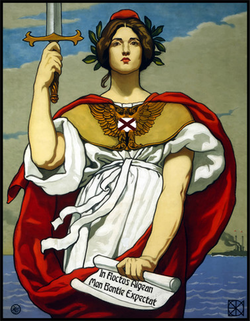 |
| Society |
| Arts and literature |
| Other |
|
Burgundie portal |
Culturally, Burgundie is one of the least vernacular and most mechanical nations in the world. This means that there is a level of homongony across the diverse and vast thalattocracy. This is an accidental side effect of the centralized, planned mechanization put forward by the various royal institutions since the First Fratricide, but especially since the Second Great War. These mechanization efforts, namely in the wide spread use of air conditioning, mass transit, and subsidized domestic migration have allowed the Burgoigniacs to live anywhere in the world under the same conditions as they would on the Ile Burgundie. Many international sociologists term this Laissez-faire Vilauristrification in reference to the fact that the phenomenon was accidental and that the Burgoignesc cultural experience is becoming more like that of the capital in Vilauristre. This has been more noticeable in the Burgoignesc territories outside of the Burgoignesc Metropole, as Levantine Burgoignesc culture is the core that many other vernacular cultures within the thalattocracy are being pulled towards. Outside of Burgundie, this has been observed across southern Audonia and western Alshar. Many in these areas see Burgundie as the paragon of modernization and progress and thus have adopted many of the mechanizations that have led to this shift in Burgundie.
However, over the last 50 years Equatorial Ostiecia has come be the cultural and economic center of Burgundie, in essence, creating a foil to the Burgoignesc Metropole.
Map Gallery
Administrative Divisions
Burgoignesc Metropole
Main Article: Burgoignesc Metropole
-
Countries in the Burgoignesc Metropole: Ile Burgundie, Nostrestran, Faramount
Ile Burgundie
Main Article: Ile Burgundie
Nostrestran
Main Article: Nostrestran
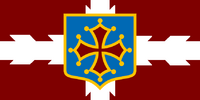
Faramount
Main Article: Faramount
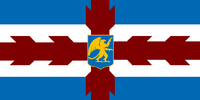
Equitorial Ostiecia
Main Article: Equitorial Ostiecia
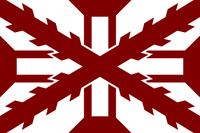
BORA
Main Article: BORA
Topographic Maps
-
Burgoignesc Metropole
Climate Maps
-
Burgoignesc Metropole
-
Burgoignesc Polar territories
-
Equatorial Osteicia
-
Burgoignesc Audonio-Alshari territories
Plant Hardiness Maps
Do you even lore if you don't have a plant hardiness map?
-
Burgoignesc Metropole

